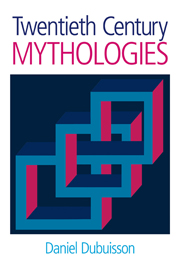Book contents
- Frontmatter
- Epigraph
- Contents
- Foreword by Professor Robert A. Segal
- Preface
- Abbreviations
- Introduction: History and comparative epistemology
- Part I Georges Dumézil, or Society
- Part II Claude Lévi-Strauss, or the Mind
- Part III Mircea Eliade, or the Sacred
- Conclusion: Modern theories of myth and the history of Western thought
- Bibliography
- Index
Conclusion: Modern theories of myth and the history of Western thought
- Frontmatter
- Epigraph
- Contents
- Foreword by Professor Robert A. Segal
- Preface
- Abbreviations
- Introduction: History and comparative epistemology
- Part I Georges Dumézil, or Society
- Part II Claude Lévi-Strauss, or the Mind
- Part III Mircea Eliade, or the Sacred
- Conclusion: Modern theories of myth and the history of Western thought
- Bibliography
- Index
Summary
Even if the reader does not lean particularly toward abrupt judgements, once he or she has arrived at this final chapter it would be tempting to come down sharply against contemporary mythological studies. They could seem to make up a vast, if disordered and heterogeneous, domain, with the worst alongside the best (without being definitively separate); and where the most lyrical mysticism is neighbour to the highest rationalist ambitions; where methodological principles overlap or cancel each other out. Is this juxtaposition of unverifiable theses, adverse philosophical and metaphysical considerations, incomplete demonstrations, irrational intuitions, fragile results, ordinary prejudices, and audacious generalizations the sole result of fifty years of reflection led by some of the best minds of the past half-century? Is contemporary science thus only capable of culminating in this discouraging position, this disappointing mixture of rigorous reflection and irrational prejudice, this incapacity to say itself where its surest contributions lie? In these circumstances, one must rely definitively on one's own preferences or convictions, as if science fundamentally were not good for much or could claim a certain authority only over trivial questions whose final result does not much matter.
If this same reader is naturally endowed with a more measured temperament, and inclined towards compromise, he or she should at least affirm these theses to be irreconcilable after all; their methods of analysis and commentary to be drawn from different principles; and their partial results generally to be incompatible.
- Type
- Chapter
- Information
- Twentieth Century Mythologies , pp. 289 - 298Publisher: Acumen PublishingPrint publication year: 2006



